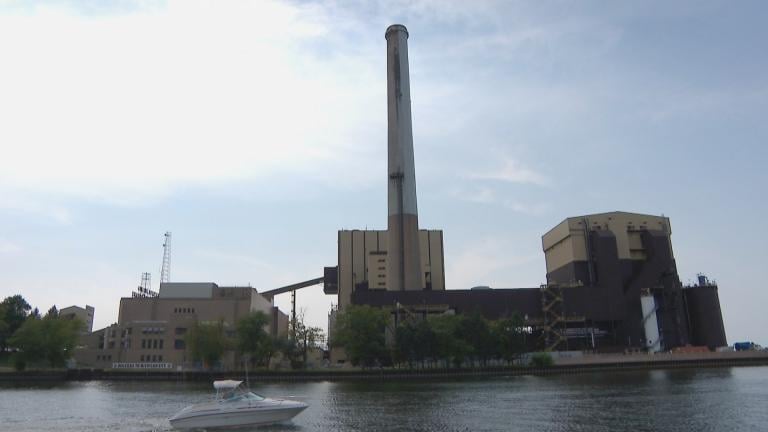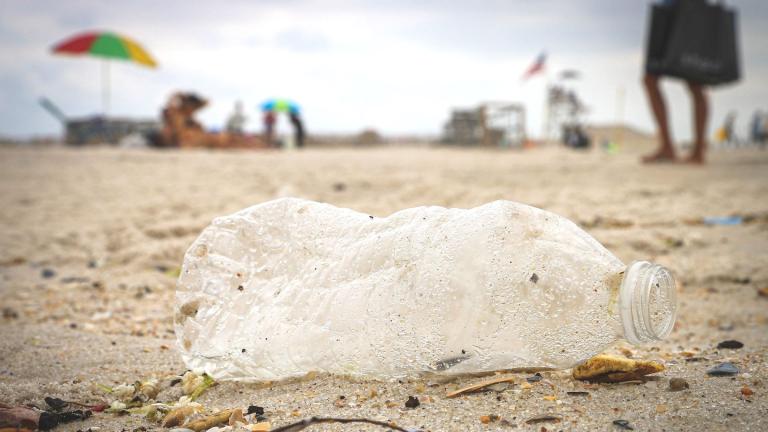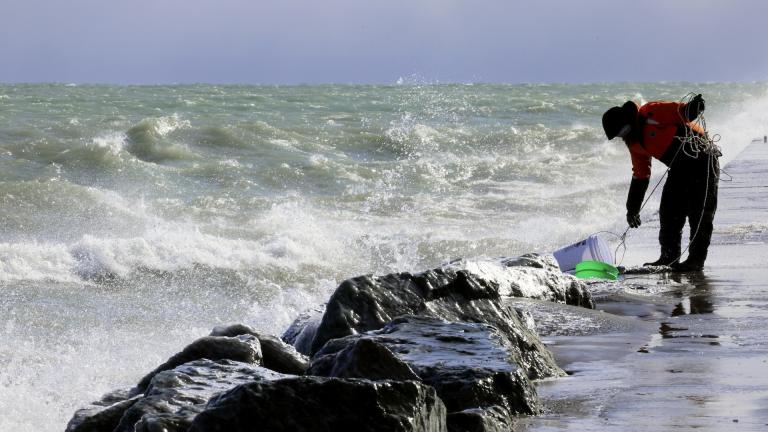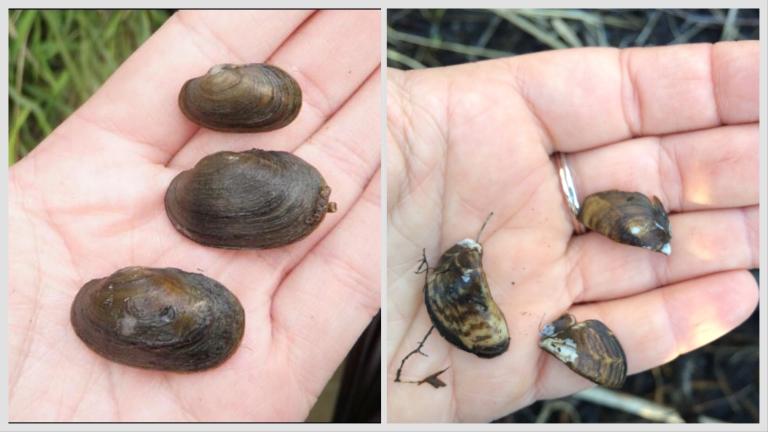The giant Chinese manufacturing company Foxconn is proposing a new plant just west of Racine, Wisconsin. But its request to withdraw 7 million gallons of water a day from Lake Michigan is being called a violation of the Great Lakes Compact.
The state of Wisconsin has promised Foxconn $3 billion in tax credits and the relaxation of some environmental laws while Foxconn has promised to invest $10 billion into the plant and provide as many as 13,000 jobs.
![]()
The city of Racine lies along the shores of Lake Michigan and many residents there were pleased when Wisconsin joined seven other states in signing the Great Lakes Compact. The compact went into effect in 2008 to prevent large diversions of water from the lakes.
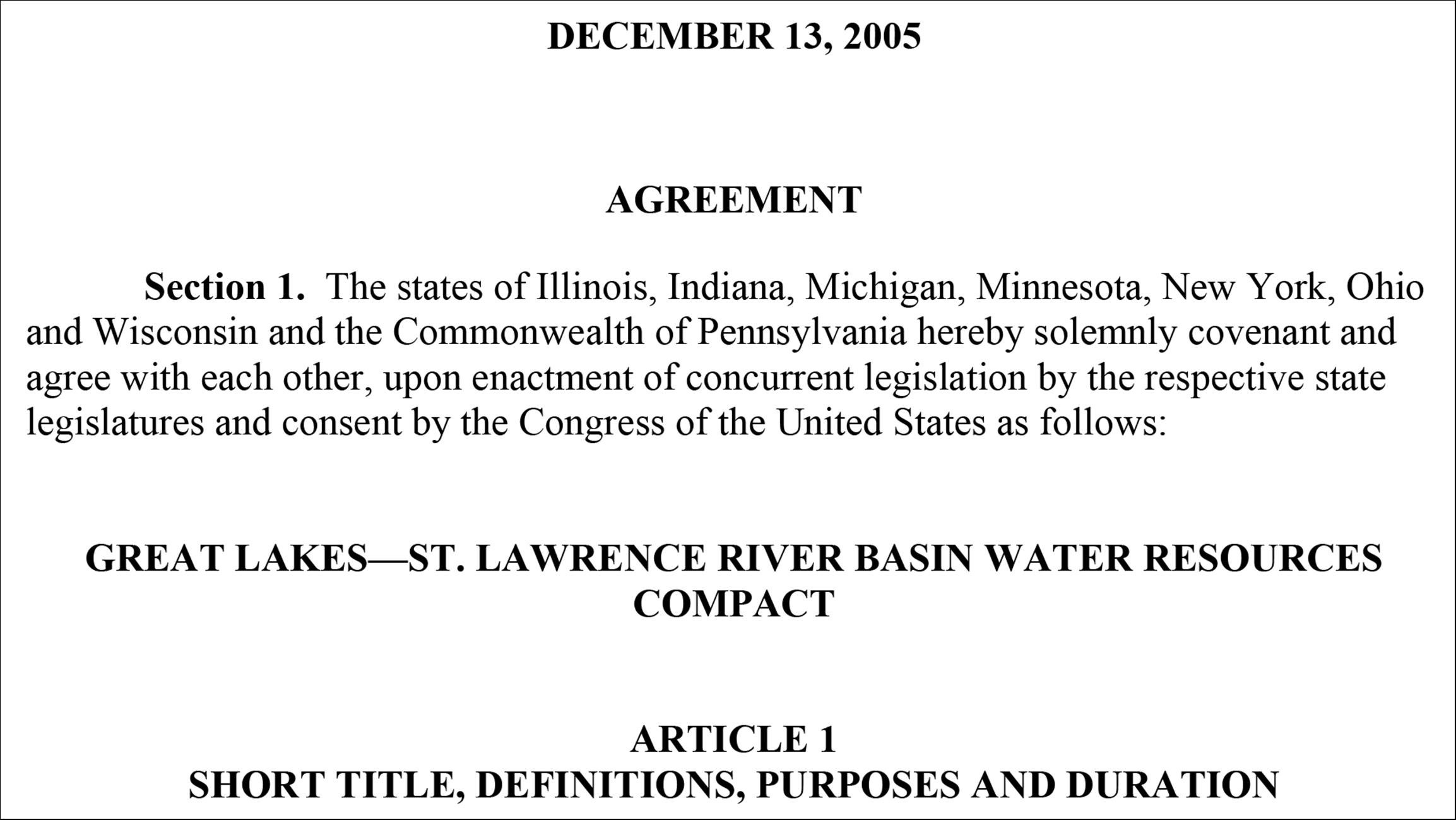 Document: Read the Great Lakes Compact
Now there is a concern that a request from the Chinese tech company Foxconn to withdraw 7 million gallons of water a day would violate the compact. The water would be used by a proposed Foxconn plant to be located on what is now mostly farmland between Racine and I-94.
Document: Read the Great Lakes Compact
Now there is a concern that a request from the Chinese tech company Foxconn to withdraw 7 million gallons of water a day would violate the compact. The water would be used by a proposed Foxconn plant to be located on what is now mostly farmland between Racine and I-94.
“Only 1 percent of Great Lakes water is actually renewable every year by rain and snowmelt, so we need to be really careful about how much we are taking out,” said Cheryl Nenn of Milwaukee Riverkeeper.
The water would be withdrawn by the Racine water treatment plant. Some 4.3 million gallons would be treated and returned to the lake, while 2.7 million gallons would be lost in the manufacturing process. The general manager of the Racine treatment plant says the 7 million gallons a day request would fall well within the 60-million gallons a day Racine is authorized to withdraw under the compact.
“On an average day like today we are probably drawing 15 million gallons. In the past decades of the ‘80, ‘70s, ‘90s, we used to draw 25 million gallons no problem every day of the year,” said Keith Haas, general manager of the City of Racine Water Utility. “Even by diverting 7 million gallons a day to this straddling community area, we won’t even get back up to where we were in the ‘70s, ‘80s and 90s.”
Racine is already installing bigger water mains to the village of Mount Pleasant near where the Foxconn facility will be built. Most of the village already gets its water from Racine. But part of the village is outside the Great Lakes basin, which means under the compact it isn’t eligible for Great Lakes water. The subcontinental divide separating the Great Lakes basin from the Mississippi River basin runs right through the middle of the proposed Foxconn site.

“Technically under the compact Racine doesn’t have the ability to actually apply for a Great Lakes diversion. The appropriate city to apply would be Mount Pleasant,” Nenn said. “And Mount Pleasant is the city where the Foxconn facility is actually going to be located, and half of Mount Pleasant is in the Great Lakes basin and half of it’s out.”
Racine’s recently elected mayor says because Racine already supplies Mount Pleasant’s water Racine is the right applicant, and he says the compact does make exceptions for communities that straddle the watershed divide.
“I was an initial author of the Great Lakes Compact bill when it passed through the legislature my first term in office and we had very clear expectations that straddling communities would likely get to serve their entire area with Great Lakes water if they were divided by the basin,” said Racine Mayor Cory Mason.
But there are restrictions on how straddling communities, like Mount Pleasant, can use that water, says activist Jodi Habush Sinykin of Midwest Environmental Advocates, a nonprofit environmental law center.
“The Great Lakes Compact does allow for straddling communities to seek a diversion of water, but it makes very clear that the water must be used for ‘public’ water supply purposes,” said Sinykin. “The village of Mount Pleasant is seeking water – 7 million gallons per day of Lake Michigan water – not for private residences in Mount Pleasant, but rather for a single industrial foreign company or factory, Foxconn.”
The amount of water being diverted and not replaced isn’t large enough to trigger a vote by all eight states in the compact. Instead the Wisconsin Department of Natural Resources will decide. At a standing room only community meeting, WDNR officials heard plenty of complaints about the diversion request.
“The League of Women Voters of Wisconsin advocates for the denial of a request by the city of Racine for the diversion of an average of 7 million gallons of water from Lake Michigan daily to meet the water needs of a private entity in the village of Mount Pleasant,” said Louise Pierog.
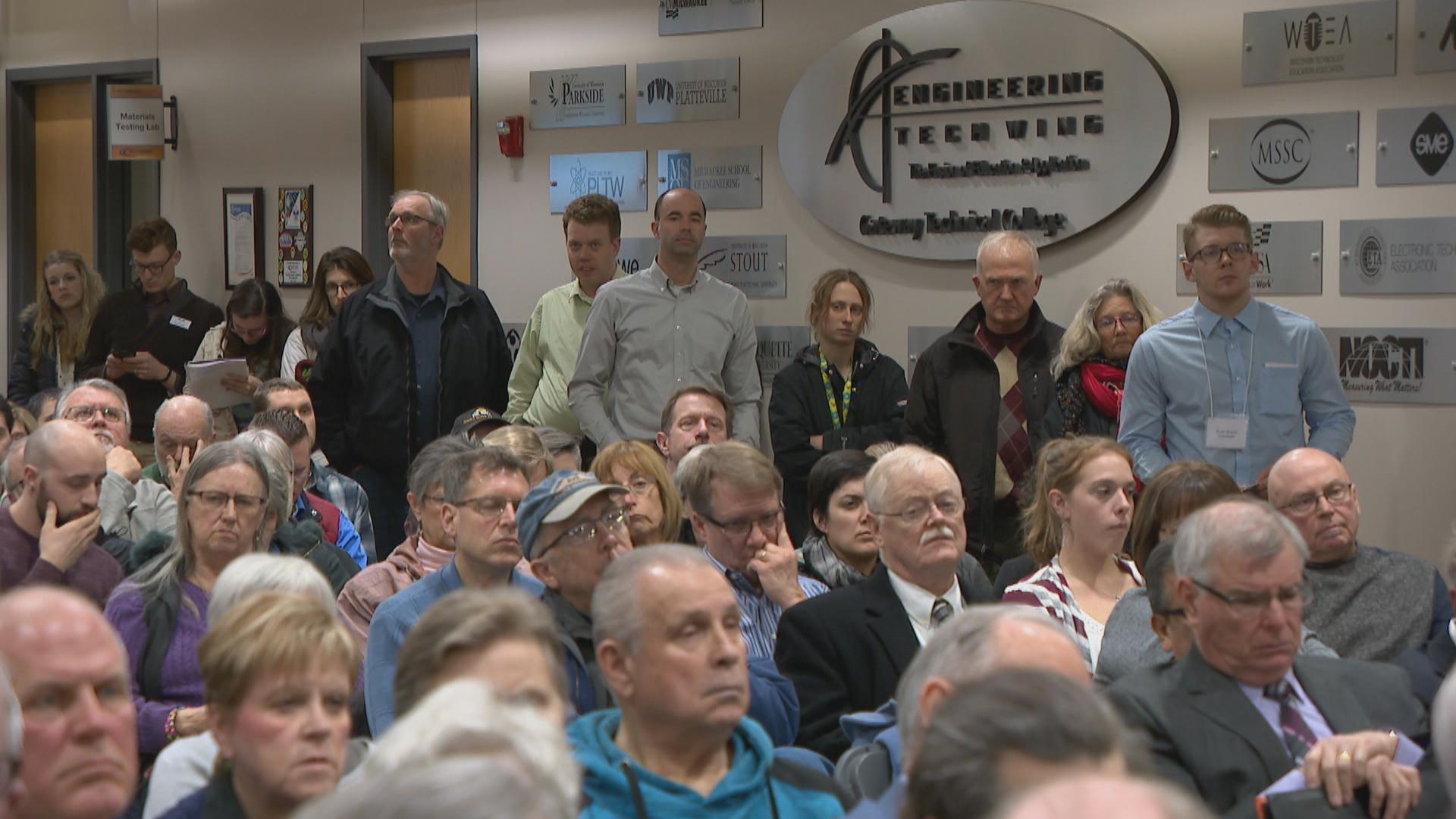
“This isn’t even close. We ask you to reject this diversion,” said Jennifer Giegerich of the Wisconsin League of Conservation Voters.
Mount Pleasant Village President David DeGroot defended the request. “If approved the diversion will have little, if any, impact on Lake Michigan water volume or quality,” DeGroot said. “What’s being drawn out will be returned less consumptive use.”
Many at the meeting were as concerned about the quality of water Foxconn would be returning to the lake as they were about the amount being withdrawn. The new Foxconn plant will manufacture LCD screens. The manufacturing process uses large amounts of water and toxic chemicals.
“We don’t know what kind of toxic chemicals might be going out with the wastewater and whether they can even be cleaned out sufficiently,” said Keisha Patel.
Foxconn’s wastewater would be treated at Racine’s wastewater treatment facility. But general manager Haas says Foxconn would have to pretreat the water to get rid of dangerous toxins.
“Foxconn would be no different than 40 other industrial permitees that we already have in Racine, and they would have to pretreat their waste at their facility. We would test it, sample it, regulate it and then they would discharge it through the system in a much lesser concentrations,” said Haas.

The mayor admits to being concerned about the environmental regulations that were waived for Foxconn. Foxconn will not be required to submit a state environmental impact statement or provide protection for wetlands.
“I offered amendments that would have said we shouldn’t do the wetlands exemptions, but on the whole I voted for the bill because of the economic opportunity to come to this area and bring thousands of people jobs,” said Mason.
The Wisconsin Department of Natural Resources says it will make a decision on the diversion request by early May. If the diversion request is granted, the environmentalists say it will weaken the ability of the compact to protect the Great Lakes when the next diversion requests are made.
“If the city of Racine is allowed to send water outside of the Great Lakes basin to this company that’s using a lot of water, you know, what’s to stop another 10 or 20 or 30 companies (from) lining up right outside the Great Lakes basin and you know, they’re going to be looking for water from cities like Racine and cities like Milwaukee which have the water to send to them,” Nenn said. “And that you know I think could set a very bad precedent for the Great Lakes overall.”
The mayor looks at Racine and sees the difference Foxconn jobs could make and does not see a violation of the compact.
“The compact was never intended to stop industrial growth within the Great Lakes basin,” said Mason. “It was meant to protect it, to bring it here and make sure that we were using it sustainably and stop large scale diversion from going over the continental divide into other states and communities.”
The Racine diversion request is only the third diversion request since the compact to protect the Great Lakes was signed. The other two requests were granted. This city by the lake awaits the decision on the third.
The Racine diversion request of 7 million gallons a day from the lake (60 percent of which will be returned) would make Foxconn one of largest users of water outside the Great Lakes basin. But it does pale in comparison to the 2.1 billion gallons Chicago is authorized to take from the lake every day, none of which is returned. The U.S. Supreme Court authorized that diversion in 1967, and it became a part of the compact when it was signed in 2008.
Related stories:
 Could Climate Change Lead to a Global Water Crisis?
Could Climate Change Lead to a Global Water Crisis?
Feb. 6: Cape Town, South Africa, could soon be the first major city to run out of water. What lessons can Chicago share – and learn?
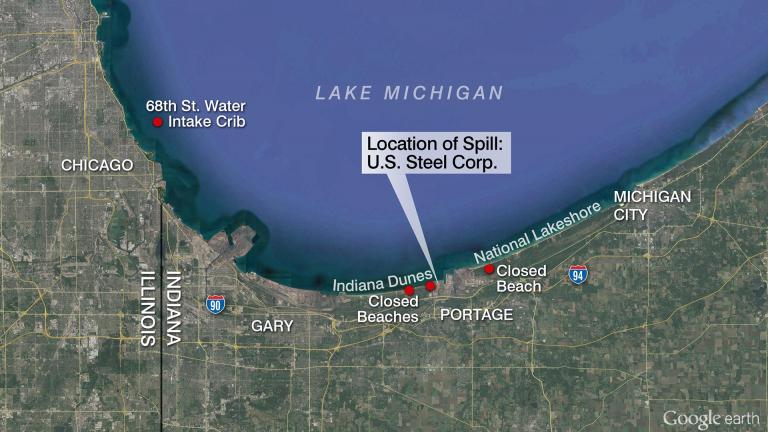 Chicago Sues U.S. Steel Over Lake Michigan Pollution
Chicago Sues U.S. Steel Over Lake Michigan Pollution
Jan. 24: The city’s lawsuit comes a week after attorneys at the University of Chicago filed their own lawsuit against the steel corporation. “This Great Lake is our most precious natural resource and we must preserve and protect it,” Mayor Rahm Emanuel said in a statement.
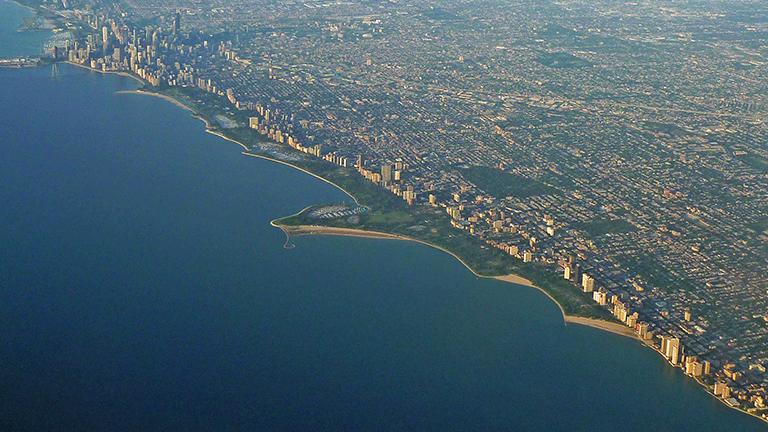 Unanimous Vote Gives Waukesha Access to Lake Michigan Drinking Water
Unanimous Vote Gives Waukesha Access to Lake Michigan Drinking Water
June 21, 2016: The city of Waukesha on Tuesday was given a green light to divert water from Lake Michigan for its drinking water supply after eight representatives from the states that border the Great Lakes voted unanimously to allow the diversion.

